Ministers cannot assume that voters will continue to back them in their plans to cap welfare benefit rises, according to a new poll commissioned by the TUC from YouGov and published last Friday.
Voters least able to give accurate answers about benefits are the most likely to back the government's policy on cutting benefits.
The poll shows that once people learn that the benefit up-rating cap will hit workers in low-paid jobs, support moves away from the government, with 40 per cent overall opposing the cap on low-paid worker benefits and only 30 per cent backing them.
The TUC's poll, carried out in the run-up to Christmas, found widespread ignorance about spending on welfare, the reality of unemployment, the generosity of benefits and the level of fraud.
 TUC General Secretary Frances O'Grady said:
TUC General Secretary Frances O'Grady said:
"It is not surprising that voters want to get tough on welfare. They think the system is much more generous than it is in reality, is riddled with fraud and is heavily skewed towards helping the unemployed, who they think are far more likely to stay on the dole than is actually the case. Indeed if what the average voter thinks was true, I'd want tough action too."
Commenting upon Tory policy, she continued:
"But you should not conduct policy, particularly when it hits some of the most vulnerable people in society, on the basis of prejudice and ignorance. And it is plainly immoral to spread such prejudice purely for party gain, as ministers and their advisers are doing, by deliberately misleading people about the value of benefits and who gets them."
She made it clear that knowledge of the facts changes mindsets:
"Voters who have a better grasp of how benefits work and what people actually get, oppose the government's plans. When people learn more about benefits, support moves away from coalition policy. Some ministers seem to see the benefit up-rating cap as a party political trap, but to counter that all you need to do is expose what the proposals really mean."
In conclusion she said:
"The truth remains that benefits are far from generous, the vast majority of the jobless are desperate for work and most benefit spending goes either on pensions or on benefits for those in jobs or who aren't able to work."
The TUC poll reveals many misconceptions about welfare and benefit spending including:
- On average people think that 41 per cent of the entire welfare budget goes on benefits to unemployed people, while the true figure is 3 per cent.
- On average people think that 27 per cent of the welfare budget is claimed fraudulently, while the government's own figure is 0.7 per cent.
 On average people think that almost half the people (48 per cent) who claim Jobseeker's Allowance go on to claim it for more than a year, while the true figure is just under 30 per cent (27.8 per cent).
On average people think that almost half the people (48 per cent) who claim Jobseeker's Allowance go on to claim it for more than a year, while the true figure is just under 30 per cent (27.8 per cent).
- On average people think that an unemployed couple with two school-age children would get £147 in Jobseeker's Allowance - more than 30 per cent higher than the £111.45 they would actually receive -
A £35 over-calculation.
- Only 21 per cent of people think that this family with two school-age children would be better off if one of the unemployed parents got a 30 hour a week minimum wage job, even though they would actually end up £138 a week better off. Even those who thought they would be better off only thought on average they would gain by £59.
The poll confirms that hostile attitudes to welfare are widespread - with over four-tenths (42 per cent) thinking that benefits are too generous and nearly three in five (59 per cent) agreeing that our current welfare system has created a culture of dependency.
But when the poll sample is divided into three equal groups based on how accurately they answered the poll questions that tested knowledge of the benefits system, those who know the least about welfare are the most hostile. More than half (53 per cent) of those in the least accurate group think that benefits are too generous, while less than a third (31 per cent) in the group who gave the most accurate answers agree that they are.
Nearly three in four (71 per cent) of the least accurate group think welfare has created a culture of dependency which falls to less than half (46 per cent) among those with the best knowledge.
When asked whether they support the government's proposed one per cent cap on benefits there is an overall clear majority support across everyone questioned (48 per cent to 32 per cent), though those with the best knowledge of the benefits system oppose the government's actions 45 to 41 per cent.
But a big three-to-one majority of the general sample (64 to 21 per cent) think that the benefit cap will mainly hit the unemployed. When told the cap will affect low-paid workers, majority support for the cap turns into majority opposition (40 to 30 per cent). There is a sharp fall among those with the least knowledge from 54 per cent backing the cap before being told about low-paid workers' benefits, to 32 per cent afterwards.
The final question in the poll asked people about how benefits should generally change each year. Only 25 per cent said they should go up less than wages or prices, with 63 per cent wanting them linked to wages, prices or both.
A poll done by Ipsos Mori and reported on in The Independant newspaper last June showed that the majority of British people were wrong on all counts with regard to crime, social security fraud and immigration issues; suggesting that their opinions were formed from prejudices and not knowledge of the subject matter they were questioned about.
Source: TUC


 TUC General Secretary Frances O'Grady said:
TUC General Secretary Frances O'Grady said:  On average people think that almost half the people (48 per cent) who claim Jobseeker's Allowance go on to claim it for more than a year, while the true figure is just under 30 per cent (27.8 per cent).
On average people think that almost half the people (48 per cent) who claim Jobseeker's Allowance go on to claim it for more than a year, while the true figure is just under 30 per cent (27.8 per cent).